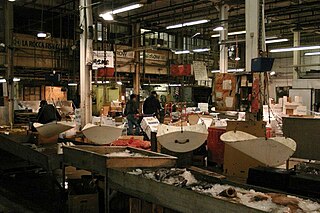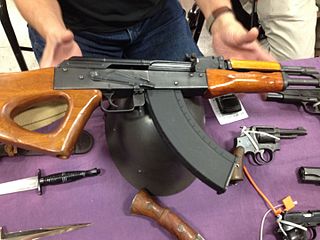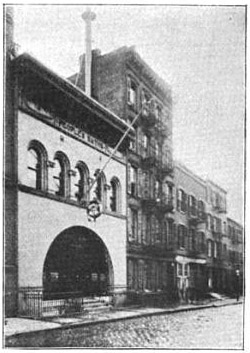
Gun control, or firearms regulation, is the set of laws or policies that regulate the manufacture, sale, transfer, possession, modification, or use of firearms by civilians.

Samuel Colt was an American inventor, industrialist, and businessman who established Colt's Patent Fire-Arms Manufacturing Company and made the mass production of revolvers commercially viable.

The Gun Control Act of 1968 is a U.S. federal law that regulates the firearms industry and firearms ownership. Due to constitutional limitations, the Act is primarily based on regulating interstate commerce in firearms by generally prohibiting interstate firearms transfers except by manufacturers, dealers and importers licensed under a scheme set up under the Act.

The Fulton Fish Market is a fish market in Hunts Point, a section of the New York City borough of the Bronx, in New York, United States. It was originally a wing of the Fulton Market, established in 1822 to sell a variety of foodstuffs and produce. In November 2005, the Fish Market relocated to a new facility in Hunts Point in the Bronx, from its historic location near the Brooklyn Bridge along the East River waterfront at and above Fulton Street in the Financial District, Lower Manhattan.
Remington Arms Company, LLC, was an American manufacturer of firearms and ammunition. It was formerly owned by the Remington Outdoor Company, which went bankrupt in 2020 with its lines of business sold to several purchasers. Two resulting companies each bear the Remington name—the firearms manufacturer is Remington Firearms owned by RemArms, LLC., and the ammunition business is Remington Ammunition owned by Vista Outdoor Inc.

In the United States, a gun show is an event where promoters generally rent large public venues and then rent tables for display areas for dealers of guns and related items, and charge admission for buyers. The majority of guns for sale at gun shows are modern sporting firearms. Approximately 5,000 gun shows occur annually in the United States.

Yorkdale Shopping Centre, Yorkdale Mall, or simply Yorkdale, is a major retail shopping centre in Toronto, Ontario, Canada. Located at the southwest corner of the interchange between Highway 401 and Allen Road, it opened in 1964 as the largest enclosed shopping mall in the world. Yorkdale is currently the third largest shopping mall in Canada by floor space and has the highest sales per unit area of any mall in Canada, with current merchandise sales levels at roughly CA$1,905 per square foot. At 18 million annual visitors, it is one of the country's busiest malls. Many international retailers have ventured the Canadian market initially at Yorkdale.

A general merchant store is a rural or small-town store that carries a general line of merchandise. It carries a broad selection of merchandise, sometimes in a small space, where people from the town and surrounding rural areas come to purchase all their general goods. The store carries routine stock and obtains special orders from warehouses. It differs from a convenience store or corner shop in that it will be the main shop for the community rather than a convenient supplement.

The Protection of Lawful Commerce in Arms Act (PLCAA) is a U.S law, passed in 2005, that protects firearms manufacturers and dealers from being held liable when crimes have been committed with their products. Both arms manufacturers and dealers can still be held liable for damages resulting from defective products, breach of contract, criminal misconduct, and other actions for which they are directly responsible. However, they may be held liable for negligent entrustment if it is found that they had reason to believe a firearm was intended for use in a crime.

Gun show loophole is a political term in the United States referring to the sale of firearms by private sellers, including those done at gun shows, that do not require the seller to conduct a federal background check of the buyer. This is also called the private sale exemption. Under U.S. federal law, any person may sell a firearm to a federally unlicensed resident of the state where they reside, as long as they do not know or have reasonable cause to believe that the person is prohibited from receiving or possessing firearms, and as long as the seller is not "engaged in the business" of selling firearms.

Gun violence is a term of political, economic and sociological interest referring to the tens of thousands of annual firearms-related deaths and injuries occurring in the United States. In 2022, up to 100 daily fatalities and hundreds of daily injuries were attributable to gun violence in the United States. In 2018, the most recent year for which data are available, the Centers for Disease Control and Prevention's (CDC) National Center for Health Statistics reported 38,390 deaths by firearm, of which 24,432 were suicides. The national rate of firearm deaths rose from 10.3 people for every 100,000 in 1999 to 11.9 people per 100,000 in 2018, equating to over 109 daily deaths. In 2010, there were 19,392 firearm-related suicides, and 11,078 firearm-related homicides in the U.S. In 2010, 358 murders were reported involving a rifle while 6,009 were reported involving a handgun; another 1,939 were reported with an unspecified type of firearm. In 2011, a total of 478,400 fatal and nonfatal violent crimes were committed with a firearm.

47th Street is an east–west running street between First Avenue and the West Side Highway in the borough of Manhattan in New York City. Traffic runs one way along the street, from east to west, starting at the headquarters of the United Nations. The street features the Diamond District in a single block, where the street is also known as Diamond Jewelry Way, and also courses through Times Square.
In the television series, Miami Vice, firearms took a key role. Episodes such as "Evan" revolved around them, while the characters themselves also used several firearms during the series. Sonny Crockett was to have used a SIG Sauer P220, but this was replaced by the then more modern Bren Ten. The importance of the firearms in Miami Vice is demonstrated by Galco International, which provided the holster used by Don Johnson on the show, naming its holster the Miami Classic. Another example of a iconic firearm is Ricardo "Rico" Tubbs' sawed-off double-barred shotgun which is prominent in Rockstar Games's landmark video-game GTA Vice City as the inspiration for the Stubby Gun.

Centre Market Place is a one block long street in Lower Manhattan, New York City, bordering Mulberry Street to the east, Grand Street to the south, Broome Street to the north, and Centre Street to the west. Centre Market Place was originally an extension of Orange Street, before being formally renamed Centre Market Place in April 1837, after Centre Market, which was west of the street. At one time, the street was at the top of a high hill. Currently, local residents consider Centre Market Place to be part of the NoLIta neighborhood. At the southern end of the street, on the corner of Grand Street, is Onieal's restaurant, which features a cavernous wine cellar that once served as a speakeasy during Prohibition. Gentlemen of means would walk through the front of the Police Building, perhaps make a contribution to the "widows and orphan fund" and then walk through the cellar corridor connecting the two buildings.
The 2008–2016 United States ammunition shortage was a shortage of civilian small arms ammunition in the United States that started in late 2008, and continued through most or all of 2010, with an additional shortage beginning in December 2012 and continuing throughout 2013.

eTrace is an Internet-based firearm trace request submission system, developed by the United States' federal government, Bureau of Alcohol, Tobacco, Firearms and Explosives, that provides for the electronic exchange of traced firearm data in a secure internet-based environment. Participating law enforcement agencies with access to the internet can acquire 24/7 real-time capabilities to electronically submit firearm trace requests, monitor the progress of traces, retrieve completed trace results, and to query firearm trace related data in Bureau of Alcohol, Tobacco, Firearms and Explosives (ATF) firearms registration database at the National Tracing Center. Firearms tracing is the systematic tracking of the movement of a firearm from its creation by the manufacturer or its introduction into U.S. commerce by the importer, through the distribution chain to the first retail purchase. Release 4.0, a bilingual version of eTrace was deployed in December, 2009 for the benefit of Spanish-speaking countries.

Brew City Shooter Supply, previously known as Badger Guns and Badger Outdoors is a gun shop in West Milwaukee, Wisconsin, just outside Milwaukee. The business has been investigated for alleged "straw purchase" sales of firearms and ammunition that brought it attention from the media and the U.S. BATF. In 2015, the firm was ordered to pay nearly $6 million to two police officers for having illegally sold a gun.
Mexicans have a right to own firearms, but legal purchase from the single Mexican gun shop in Mexico City, controlled by the Army, is extremely difficult. In other cases the guns are obtained through Guatemalan borders, or stolen from the police or military, or bought from corrupt officials. Consequently, black market firearms are widely available. Many firearms are acquired in the U.S. by women with no criminal history, who transfer their purchases to smugglers through relatives, boyfriends and acquaintances who then smuggle them to Mexico a few at a time. The most common smuggled firearms include AR-15 and AK-47 type rifles, and FN 5.7 caliber semi-automatic pistols. Many firearms are purchased in the United States in a semi-automatic configuration before being converted to fire as select fire machine guns. In 2009, a combined total of more than 4,400 firearms of the AK-47 and AR-15 type, and 30% of AK-47 type semi-automatic rifles seized in Mexico have been modified as select fire weapons.

Proposals for universal background checks would require almost all firearms transactions in the United States to be recorded and go through the National Instant Criminal Background Check System (NICS), closing what is sometimes called the private sale exemption. Universal background checks are not required by U.S. federal law, but at least 21 states and the District of Columbia currently require background checks for at least some private sales of firearms.

A gun shop is a business that sells firearms, such as handguns and long guns, to individuals in an open shopping format. It may also provide repairs for firearms and their parts. Other items such as ammunition, hunting accessories, food, clothing, and even souvenirs may be sold in the store as well.
















